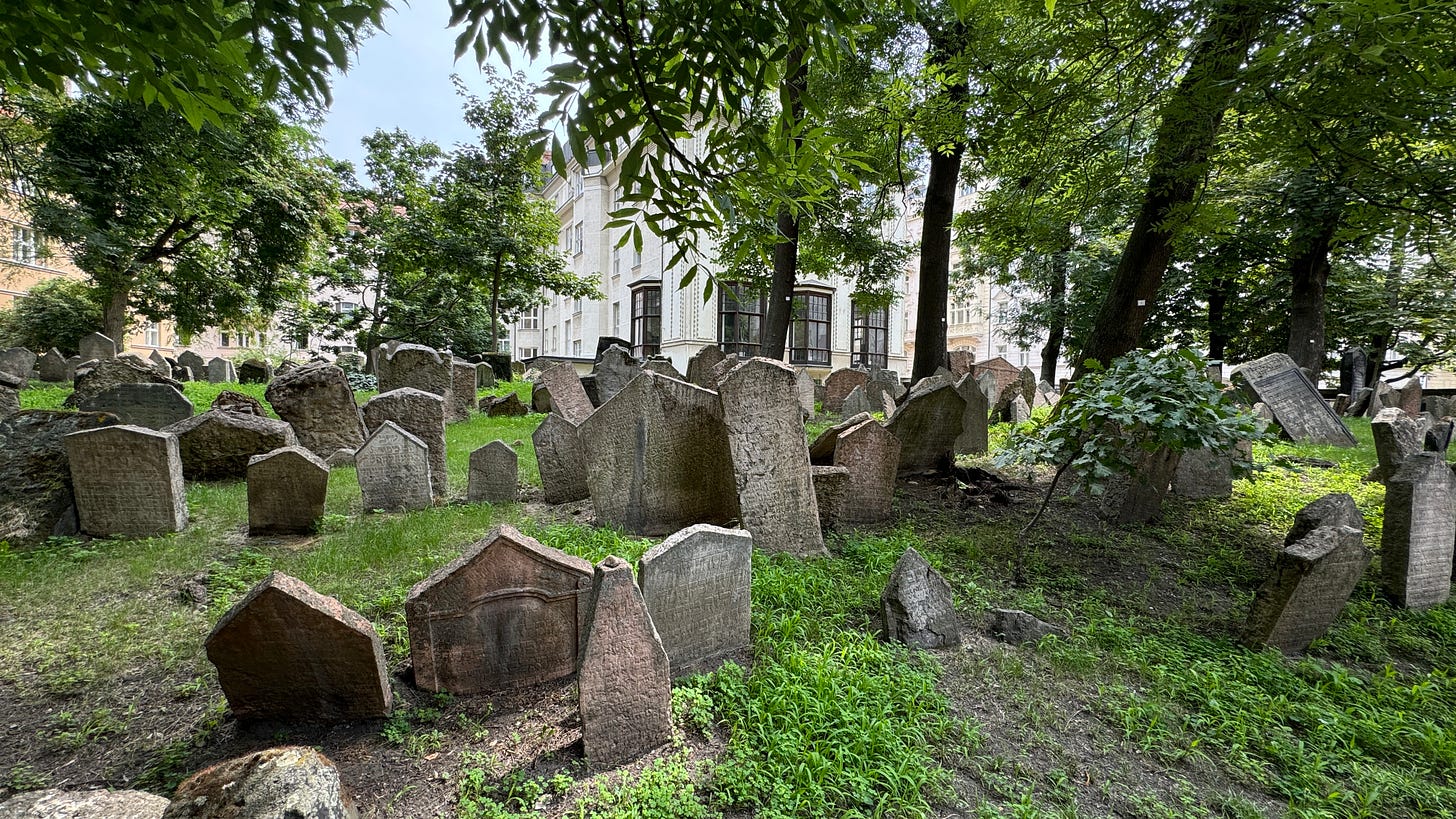But it’s weird to be a Jew in Prague. While there is a remnant of Jews still living there, you can't help but be struck by the museum-like nature of the Jewish presence in the city.
You should read this Substack article by Russ Roberts on his recent trip to Prague.
Jewish life may not be vibrant but tourism for Jews and about Jews is quite healthy. The Jewish part of town is thronged with visitors eager to see those old synagogues, the Holocaust memorial, and the Jewish cemetery.
And yes, some Jews still live in Europe 80 years after the Holocaust. But the Jewishness of Prague and Vienna and similar capitals is in the past rather than the present. There is something macabre about savoring the Jewishness of Prague’s past knowing how the story ended.
I knew this of course before I went to Prague, at least in some abstract sense. Visiting in person makes vivid what has been lost.
We visited Prague in 2014. Lovely city. We also visited the Jewish sites, including the memorial with the names of the tens of thousands transported to their death by the Nazis.
I had an experience similar to Roberts' more than thirty years ago while visiting Worms, Germany in the early 90s. I had a business trip to Europe which was to start with a meeting at our plant in Worms on a Monday and I decided to fly over early to help with the time adjustment, arriving on Saturday morning.
It was January when the daylight was already very limited and a gray mass hung low over the city during those nominal daylight hours creating a penetrating gloom on my walks. The Nibelungen Hotel was my residence, decorated in a palate of grays, browns, and blacks, very appropriate to Worms and the time of year. I visited the cemetery, the oldest surviving Jewish cemetery in Europe with its origins in the 11th century. The Nazis destroyed all of the other Jewish cemeteries in Germany but were persuaded to keep the one in Worms for historical purposes. It resembles the photo of the Prague cemetery (below) except that the trees are much older, thicker, taller, and more twisted.
 |
Though the Jewish community was wiped out during the time of the Third Reich, there is a Jewish museum in Worms which I also visited. It was a strange experience, leaving me feeling like a spectral figure peering into a lost past, the member of a lost tribe. Perhaps it would be like an American Indian descendant from one of the New England tribes that exist today only in memory.
Roberts goes on to note another absence in Prague.
But one night in Prague, I realized that the lost Jewishness of Prague has a very strange bedfellow. I was sitting in St. Clement’s Cathedral listening to an hour-long concert of classical music’s greatest hits—Mozart, Bach, Pachelbel, Schubert, Vivaldi, and others. I realized that Judaism is not the only religion that is a shell of its former self in the sense of its role in the daily life and culture of a great city. The same would be true of Christianity.
The Christian impulse that built such magnificent cathedrals and inspired some of the finest music human beings have ever composed, plays no role in the current culture of Prague any more than Judaism does.
It was a strange moment for me, this realization of kinship between the two sister religions. It does make a difference that Christians were not herded into railroad cars and murdered as the Jews were. But both religions are essentially being kept alive by a remnant, a remnant that is not embedded in a serious way in the life of the city other than as a tourist attraction. I don't remember who made the observation but it is a deep one, that some of the greatest creations of human beings--the cathedrals in particular, but you could also include the music--were inspired by something very few Europeans believe in any longer—Christianity.
As a Jew thinking about Christianity in Europe, what comes to mind is the Inquisition, the blood libels, the pogroms, and the church-driven expulsions from country after country. It’s harder to remember that Christianity was a revolution in how we human beings see ourselves. The post-Christian attempts to inspire a new way of seeing ourselves, communism and fascism, dwarf Christianity in their cruelty to the Jews and to humankind generally.
Though not as dramatic as in Europe, we are also seeing an ebbing in Christian belief in the United States. But people always need to believe in something. Something will fill, and may already be filling, that need.
It's part of the new world that is emerging. The Cold War ended in 1991 in a way that no one, other than Ronald Reagan, would have predicted a decade earlier. Since then a new world has been struggling to emerge, an emergence accelerated, in retrospect, by the 2008 financial crisis, and which has been accelerating even more rapidly in recent years. What the shape of that world will ultimately be is unpredictable.
No comments:
Post a Comment